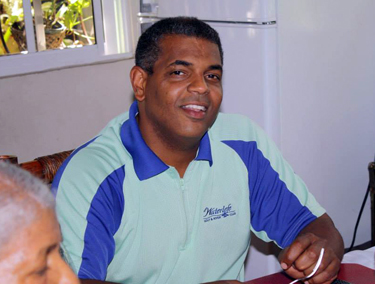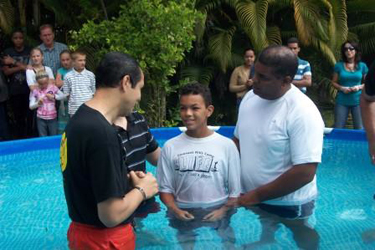By Mark Ellis —

He grew up in the Dominican Republic, but in his teenage years he turned away from God because he thought God was a cosmic killjoy.
“I got angry because the first missionary who came to our country taught the gospel and culture,” says Samuel Luna, the founder of Nation in Transformation. “I learned that Christians don’t dance or play baseball on Sunday,” he recalls. “I decided I didn’t want to follow this God.”
For the next couple years he sowed wild oats, smoking marijuana and carousing with his friends.
His wayward lifestyle led to even greater emptiness. “My soul was empty, like a squeezed orange – no juice,” he says. “I was suicidal and wondered to myself, Why keep on living?
Then God visited Samuel one night through a powerful dream. God impressed on his heart, I will give you one last opportunity to come to me.
In the dream, he saw himself touching people and they were being healed — not just physically, but holistically.
When he shared the dream with his mother the next morning she said, “God is calling you.”
He knew she was right. After a two-year absence, he returned to church. Shortly after that an evangelistic crusade came to his town and he decided to attend because he was “seeking hope.”
On the third night of the crusade, he went forward to surrender his life to Jesus Christ. “I didn’t really hear the message, but the Holy Spirit led me up front. He chose me!” he recounts.

Samuel attended UASD, the oldest college in the Americas – founded in 1538 – which was strongly influenced by Cuban-style communism. He also attended seminary for three months in the summer and was taught liberation theology.
“Some people believe this is bad, or controversial, but my heart was inclined to support the poor people,” he recalls.
He got very involved with Youth for Christ and Young Life. Then he became the national president for youth in the Free Methodist Church. For nine years, he was the director of the YWAM training center in Jarabacoa.
More recently, he founded Nacion En Transformacion (Nation in Transformation). “Our goal is to break the cycle of poverty, to create a critical mass to reduce the level of corruption and injustice,” he says.
Through his friendship with an aspiring politician, he has been drawn into the periphery of public life. “It’s not about politics,” he notes. “It’s about the Kingdom of God being reflected in every sphere. We shouldn’t separate the secular and the spiritual. Everything we do has to reflect the character of God.”
If you want to know more about a personal relationship with God, go here



